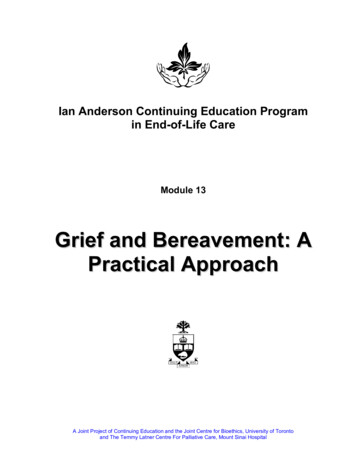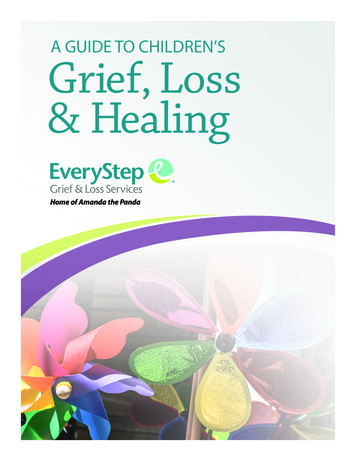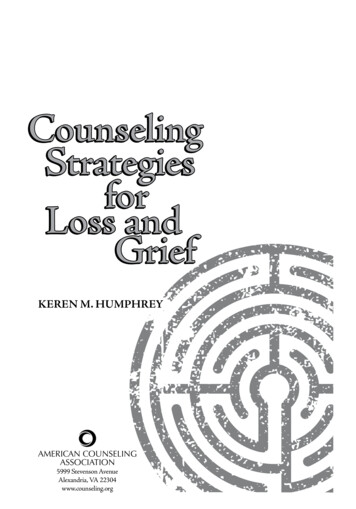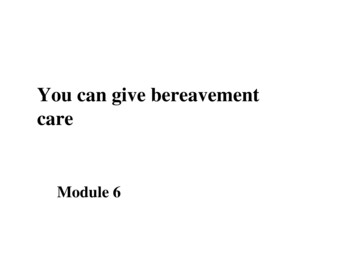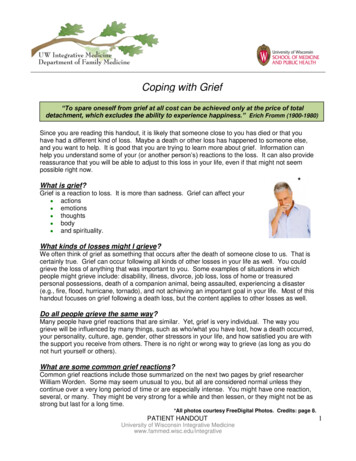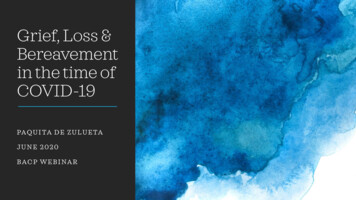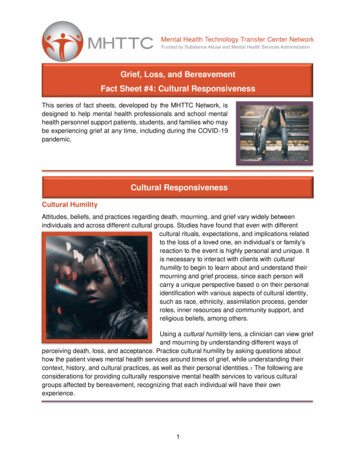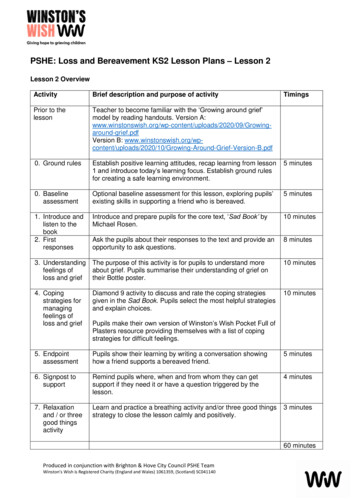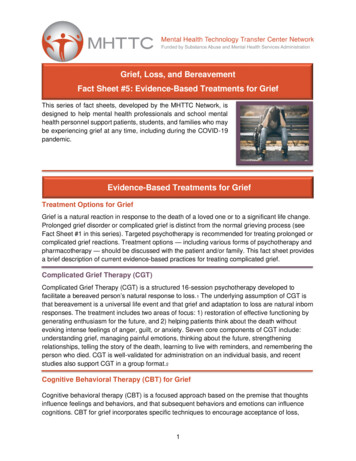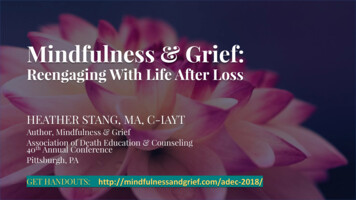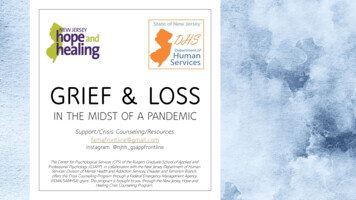
Transcription
GRIEF & LOSSIN THE MIDST OF A PANDEMICSupport/Crisis ram: @njhh gsappfrontlineThe Center for Psychological Services (CPS) of the Rutgers Graduate School of Applied andProfessional Psychology (GSAPP), in collaboration with the New Jersey Department of HumanServices’ Division of Mental Health and Addiction Services, Disaster and Terrorism Branch,offers this Crisis Counseling Program through a Federal Emergency Management Agency(FEMA/SAMHSA) grant. This program is brought to you through the New Jersey Hope andHealing Crisis Counseling Program.
Terminology Grief: The emotional reaction to the loss What do you feel? Mourning/Bereavement: Readjusting to having lost someone orsomething significant What do you do?
Types of LossDeath of a loved oneLoss of physical health or mobilityLoss of cognitive function/mental healthLoss of a partner or familyLoss of a job/financial securityLoss of social interactionsLoss of a dreamLoss of opportunities or experiencesLoss of trust/faith
Factors that AffectMourning Nature of the relationship with the loss Strength of attachment Ambivalence or conflict Type of death Social variables Support network Cultural influences Other stressors on the bereaved Secondary losses
STAGES OFGRIEFKübler-Ross Model
Acute Grief Immediately and for months after a loss Intense symptoms of shock, distress, sadness, poor appetite, troublesleeping, and poor concentration These symptoms slowly diminish as time passesGrievingProcess Complicated Grief Sometimes the symptoms of acute grief don’t seem to go away andcan last for years The loss continues to feel unreal and unmanageable*not identical for everyone* Integrated Grief (Lifelong Stage) After resolving intense symptoms of acute or complicated griefAccepting the reality of the loss and resuming daily life activitiesLearning to cope with the pain of the lossAcute grief may show itself again around anniversaries, holidays, andother reminders
What not to say to a griever:-I know how you feelThis too shall passYou’ll be alrightYou’re still young, you have your whole life aheadof youIt was God’s willSomething good will come of thisThey are in a better place nowThey are out of painDeath was a blessingYou must be strong for your children/parentAt least [anything]What to say to a griever:-I’m so sorry for your lossI can’t imagine what you are feeling right nowI’m here to help you however I canAsk specific questions/offer specific services
Coping Skills Take care of your body- Drink water and eat healthy foods, especially if stress is rendering you unable to eat, tryto sip water and eat soft foods Tell your story-Talk, ask questions, and find support in the process of your grief. Even though sharingemotions is difficult, it is important to find someone who can listen to you. Write in a journal- Write down how you honestly feel and pay attention to changes as the weeks go by Exercise- Exertion during exercise can help calm nerves and help the body and mind relax Try mindfulness- Focusing on the present moment helps manage emotions and physical symptoms
Resource: https://www.headspace.com/Mindfulnessand Grief- Being present in ourgrief- Not judging ourthoughts and feelings- Noticing and makingspace for our thoughtsand feelingsPractices:Mindful Breathing, MindfulWalking, Loving KindnessRadical Acceptance PracticeBreathe while focusing on that which is uncomfortable: depression,fear, anger, hopelessness. Notice that despite having disturbingthoughts, you are still breathing
GRIEFSENTENCECOMPLETIONEXERCISEFurther exercises and worksheets-to-help-thosecoping-with-grief Right now, I feel I feel the saddest when. The thing I miss most about my loss is. Since the loss, things have been different because. My family and loved ones usually feel. If I could ask [person or thing I lost] one thing, I wouldask. Something I liked about [person or thing I lost] was. One thing I learned from [person or thing I lost] is.
Helpful Books Disenfranchised Grief by Kenneth Doka - http://drkendoka.com/ Coping with disenfranchised grief – the types of loss that are not so readily recognized or supported by society Ambiguous Loss by Pauline Boss - https://www.hup.harvard.edu/catalog.php?isbn 9780674003811 Learning to live with unresolved grief Option B – Facing Adversity by Sheryl Sandberg - https://optionb.org/book Building resilience and finding joy Grieving Mindfully: A Compassionate and Spiritual Guide to Coping with Loss by Sameet M Kumar, ully-sameet-kumar/1111422673 The Grief Recovery Handbook: Action Plan for Moving Beyond Death, Divorce and Other Losses by JohnJames and Russell Friedman - covery-handbook
Resources National Suicide Prevention Lifeline – 1-800-273-8255 Caring Contact Crisis Line – 1-908-232-2880 Crisis Text Line – text “heart” to 741-741 SAHMSA’s National Helpline – 1-800-662-4357- 1-800-487-4889 (English and Spanish) Grief Hotline – 1-877-488-3047 The Compassionate Friends - https://www.compassionatefriends.org/ Grief Speaks - http://www.griefspeaks.com/ Ted Talks - https://www.ted.com/search?q grief
GRIEF & LOSS IN THE MIDST OF A PANDEMIC Support/Crisis Counseling/Resources: femafrontline@gmail.com Instagram: @njhh_gsappfrontline The Center for Psychological Ser
